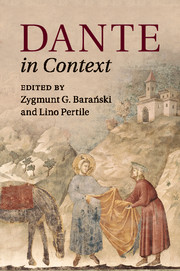Book contents
- Frontmatter
- Dedication
- Contents
- List of illustrations
- List of maps
- Notes on contributors
- Chronology
- Abbreviations and note on translations
- Introduction
- Part I Politics and society
- Part II Intellectual traditions
- 9 Philosophy and theology
- 10 Moral philosophy
- 11 Natural philosophy
- 12 Medicine
- 13 Islamic and Jewish influences
- 14 Cosmology, geography, and cartography
- Part III Linguistic and literary cultures
- Part IV Visual and performative culture
- Part V Dante: life, works, and reception
- Further reading
- Index
11 - Natural philosophy
from Part II - Intellectual traditions
Published online by Cambridge University Press: 05 October 2015
- Frontmatter
- Dedication
- Contents
- List of illustrations
- List of maps
- Notes on contributors
- Chronology
- Abbreviations and note on translations
- Introduction
- Part I Politics and society
- Part II Intellectual traditions
- 9 Philosophy and theology
- 10 Moral philosophy
- 11 Natural philosophy
- 12 Medicine
- 13 Islamic and Jewish influences
- 14 Cosmology, geography, and cartography
- Part III Linguistic and literary cultures
- Part IV Visual and performative culture
- Part V Dante: life, works, and reception
- Further reading
- Index
Summary
In the evolution of physics, or ‘natural philosophy’, as it was more popularly known, the period 1250 to 1350 was of crucial importance. By 1250, dramatic changes had transformed the intellectual life of western Europe. By the latter half of the twelfth century, Aristotle's (384–322 BCE) natural philosophy, which had been virtually unknown in western Europe since the sixth century CE, was turned into Latin by a number of translators, most notably Gerard of Cremona (c.1114–87), who translated Aristotle's natural philosophy from Arabic; also noteworthy is Michael Scot (1175–1232) who around 1220 translated, from Arabic to Latin, a number of commentaries on Aristotle's treatises on natural philosophy by the famous Islamic scholar Averroes (Ibn Rushd, 1126–98).
Because Latin and Greek are cognate languages, translations from Aristotle's Greek texts were normally more faithful to the originals than were those from Arabic. For this reason, the translations of Aristotle's natural philosophy from Greek by William of Moerbeke (c.1215–c.1286) in the 1260s were of great importance. Moerbeke also translated a few Greek commentaries on Aristotle's works by such ancient Greek commentators as John Philoponus (c.490–c.570), Simplicius (c.490–c.560), and Themistius (317–c.387). Thomas Aquinas (1225–74) was one of the first to use Moerbeke's translations. By the last quarter of the thirteenth century in western Europe virtually all of Aristotle's treatises on natural philosophy were available in Latin.
Indeed, as early as 1200 Aristotle's treatises on natural philosophy were readily available and sufficiently well known to form the basis of the curriculum in the Faculties of Arts in the two great new universities of Paris and Oxford (the University of Bologna, which may have preceded Paris and Oxford by a few years, emphasized law rather than arts). Within the university context, natural philosophy, or the less often used equivalent natural science, was taught in the Faculty of Arts, in which all students were required to enrol and study for the Bachelor of Arts degree and, if they continued on, a Master of Arts degree. Degrees in the Arts Faculties were required before students could go on to study in the graduate disciplines of theology, law, and medicine. Because all university students across Europe were required to study natural philosophy, it is no exaggeration to claim that knowledge about the physical world and its operations was widespread and deeply embedded in European intellectual life, a phenomenon unique to western Europe.
- Type
- Chapter
- Information
- Dante in Context , pp. 173 - 188Publisher: Cambridge University PressPrint publication year: 2015
- 1
- Cited by



